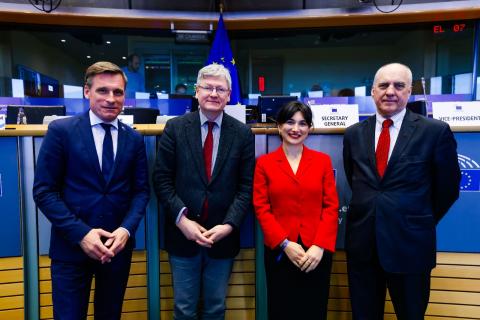European Economic
and Social Committee
The success story of 2004 paves the way for the future EU enlargement
At its May plenary, the European Economic and Social Committee (EESC) discussed lessons learned from the 2004 EU enlargement. The current geopolitical and security situations make further enlargement an even more urgent task for Europe.
The May plenary debate dedicated to the great 2004 enlargement held by the EESC included input from guest speakers who played a significant role in the negotiation process, including Jarosław Pietras from Poland, László Andor from Hungary and Štefan Füle from Czechia. The main focus of the debate was the success of the post-accession economical and societal transformation in the newly admitted countries. 20 years after their accession, given its major success, we can officially do away with the term ‘new EU Member States’.
During the plenary, the EESC members reaffirmed that the decision to enlarge the EU in 2004 demonstrated the Union’s commitment to unity, diversity and solidarity. The enlargement enhanced the EU’s influence and stability, and boosted the standard of living of the newly admitted nations.
In the discussion, participants stressed that the EU – which only recently regained its interest in further enlargement – needed to provide a clear roadmap to accession for the candidate countries. Leave them knocking on the door too long, and the enlargement process could lose its credibility. Candidate countries and citizens could lose faith in an EU future, with the EU missing its chance to encourage democratic and free market reforms. The future accession of Ukraine will be a new investment in common European security and welfare, as was mentioned in the debate.
EESC President Oliver Röpke said: ‘The 20-year anniversary marks not only a significant milestone, but also the ongoing success of the EU enlargement process, with more countries aspiring to join. We must recognise the influence of ideas, ideals and role models in shaping the European project. This is why our commitment to enlargement must remain strong, guiding candidate countries along the European path’.
Jarosław Pietras, former Polish Secretary of State in charge of EU accession, referred to Poland and the post-accession economic prosperity of its central European counterparts. This achievement highlights the transformative impact of EU integration on the economies of newly admitted states, despite the deep financial crisis that Europe was going through at that time. ‘Enlargement is a two-way transformation process, bringing benefits not only to the candidate countries but also to the EU Member States’, he said.
Speaking about the driving force of the 2004 enlargement, Dr Tinatin Akhvlediani, Research Fellow in the EU Foreign Policy Unit at the Centre for European Policy Studies, highlighted the economic aspects of enlargement, given the fact that candidate countries at the time had been experiencing poor financial situations. The EU funds had proven to be very useful for developing economies that had a social dimension, which had delivered substantial benefits for citizens.
However, Dr Akhvlediani pointed out that the main motivation for future enlargement was security. ‘If the EU is to be ready for the next enlargement, it has to guarantee that it can protect its enlarged EU borders’, she said.
László Andor, Secretary General of the Foundation for European Progressive Studies, pointed to the rule of law issues as one of the deficiencies of the 2004 enlargement. Even though the EU had discussed the risks related to the rule of law, it did not create the right tools to address them. ‘That is why the rule of law conditionality has emerged over the past few years’, he said.
Štefan Füle, former European Commissioner for Enlargement, and Chairman of the European Policy Centre Task Force on EU enlargement, gave insights on the ‘big bang enlargement’, stressing that ‘we need to prepare both candidate countries and the EU Member States for the new wave of enlargements’.
He also emphasised that the accession process needed to be reformed by putting fundamental values first, ‘because if we don’t link the phases of the accession process to our values, then we will not make genuine progress with the candidate countries towards the EU’.
Background information
The EESC is the first EU institution to gradually integrate EU candidate countries – including the Western Balkan partners – in its work, through its Enlargement Candidates Members initiative. As of February, 146 representatives from those countries have been able to work alongside EESC members in drafting opinions on issues that matter to them, such as cohesion policy, the single market and the rule of law.
As a next step, the EESC will organise a Civil Society Enlargement Summit on 19 September, inviting all the enlargement candidate members to participate in the EESC plenary session for the first time ever.
